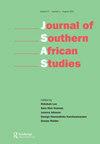津巴布韦政治化土地景观中的社会分化与“自上而下的积累”
IF 0.7
4区 社会学
Q2 AREA STUDIES
引用次数: 0
摘要
津巴布韦的快速土地改革计划从根本上改变了该国的农业结构,从白人拥有的大型农场主导转变为一大群黑人家庭农民主导。自2017年以来,出现了一系列解释,试图解释农村社会分化的过程。这些解释主要是由唯物主义方法提供的,并将这一过程概念化为自下而上的积累,即重新安置的农民通过自己的农业生产在内部产生差异,从而形成不同的“阶级结构”。这种唯物主义方法关注农场的生产关系,但没有密切关注更广泛的国家实践和政治进程在高度政治化的农业景观中形成积累动态的作用。本文认为,不能将津巴布韦的社会分化过程与2000年后的政治发展分开来充分研究,当时该国越来越被重新配置为一个由爱国历史叙事合法化的暴力和庇护场所。根据2007-2008年国家主导的旨在向重新安置的农民分发农业设备的农业机械化计划的新证据,我认为,差异化过程在很大程度上采取了国家和地方两级优先获得农业设备的形式。我把这种“来自上层的积累”称为执政的津巴布韦非洲民族联盟(爱国阵线)(ZANU[PF])的赞助人客户。这些客户包括基层和高级党员或与之有联系的人、内阁部长、法官、安全部门成员、公务员、国家选举管理人员和传统领导人,他们反过来在不稳定的政治农业环境中维持非洲民族联盟的政治霸权。本文章由计算机程序翻译,如有差异,请以英文原文为准。
Social Differentiation and ‘Accumulation from Above’ in Zimbabwe’s Politicised Agrarian Landscape
The fast-track land reform programme in Zimbabwe radically transformed the country’s agrarian structure from one dominated by white-owned, large-scale farms to one dominated by a large group of black family farmers. Since 2017, a set of explanations has emerged that attempts to explain processes of social differentiation in the countryside. These explanations are predominantly informed by a materialist approach and conceptualise this process as accumulation from below, whereby the resettled farmers become internally differentiated through their own agricultural production resulting in different ‘class formations’. This materialist approach focuses on relations of production on the farm but does not pay close attention to the role of wider state practices and political processes involved in shaping accumulation dynamics in highly politicised agrarian landscapes. This paper argues that processes of social differentiation in Zimbabwe cannot be adequately studied in isolation from the political developments of the post-2000 period, when the state increasingly became reconfigured as a site of violence and patronage legitimated by patriotic history narratives. Based on new evidence on the 2007–08 state-led farm mechanisation scheme that was intended to distribute farm equipment to resettled farmers, I argue that the processes of differentiation largely took the form of preferential access to farming equipment both at the national and local levels. I term this ‘accumulation from above’ by patronage clients of the ruling Zimbabwe African National Union (Patriotic Front) (ZANU[PF]). These clients include grassroots and senior party members or those linked to it, cabinet ministers, judges, members of the security sector, civil servants, national election administrators and traditional leaders who in turn sustain ZANU(PF)’s political hegemony in an unstable political agrarian landscape.
求助全文
通过发布文献求助,成功后即可免费获取论文全文。
去求助
来源期刊

Journal of Southern African Studies
AREA STUDIES-
CiteScore
1.40
自引率
0.00%
发文量
73
期刊介绍:
The Journal of Southern African Studies is an international publication for work of high academic quality on issues of interest and concern in the region of Southern Africa. It aims at generating fresh scholarly enquiry and rigorous exposition in the many different disciplines of the social sciences and humanities, and periodically organises and supports conferences to this end, sometimes in the region. It seeks to encourage inter-disciplinary analysis, strong comparative perspectives and research that reflects new theoretical or methodological approaches. An active advisory board and an editor based in the region demonstrate our close ties with scholars there and our commitment to promoting research in the region.
 求助内容:
求助内容: 应助结果提醒方式:
应助结果提醒方式:


